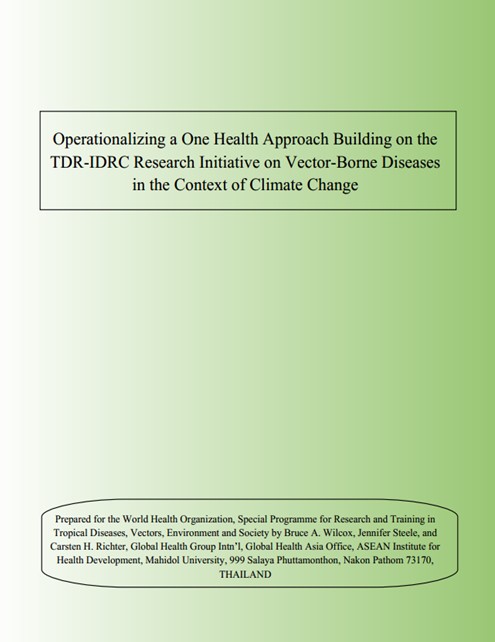| ชื่องานวิจัย: | Operationalizing a One Health Approach Building on the TDR-IDRC Research Initiative on Vector-Borne Diseases in the Context of Climate Change |
| คณะ/สาขาวิชา: | ASEAN Institute for Health Development |
| ที่มาและความสำคัญ: | The capacity to undertake successful vector borne disease (VBD) control campaigns, whether for global priorities like malaria elimination or control of NTDs, has been found to improve substantially with greater emphasis on local engagement including community empowerment, multisectoral cooperation, and multi-disciplinary collaboration. This is especially critical for VBD control in the context of climate change and human population vulnerability. This project identifies gaps and capacity strengthening opportunities for operationalizing and implementing One Health, including for resource mobilization in this regard. |
| ขอบเขต/พื้นที่ศึกษา: | Africa and other regions |
| วัตถุประสงค์: | To stimulate the generation of new knowledge, research capacity, collaboration, and policy advice products for use throughout Africa and other regions |
| แหล่งทุนสนับสนุน: | World Health Organization , Special Programme for Research and Training in Tropical Diseases, Vectors, Environment and Society |
| หน่วยงานที่ร่วมมือ: | Global Health Group International |
| ผู้มีส่วนได้ส่วนเสีย: | Africa countries |
| ระดับความร่วมมือ: | ระดับนานาชาติ |
| ผลลัพธ์ที่นำไปใช้ประโยชน์ต่อ (ระบุวันที่มีการนำไปใช้): | Findings were incorporated into the National Action Plans for Climate Change in Africa to address endemic tropical diseases including malaria, schistosomiasis, African trypanosomiasis, and Rift Valley fever. |
| Web link อ้างอิงผลลัพธ์หรือการดำเนินงาน: |
เอกสารแนบประกอบ: https://www.fondation-merieux.org/wp-content/uploads/2019/05/onehealth-meeting-2019-operationalizing-a-one-health-approach.pdf
เอกสารแนบประกอบ: https://drive.google.com/file/d/1-CmI_nhsYgRdZDrpx1y3d_JP-pJ6QZBM/view?usp=sharing |
| รูปภาพประกอบ: |

|
| SDG goal ที่เกี่ยวข้องอื่นๆ: | 3 13 |